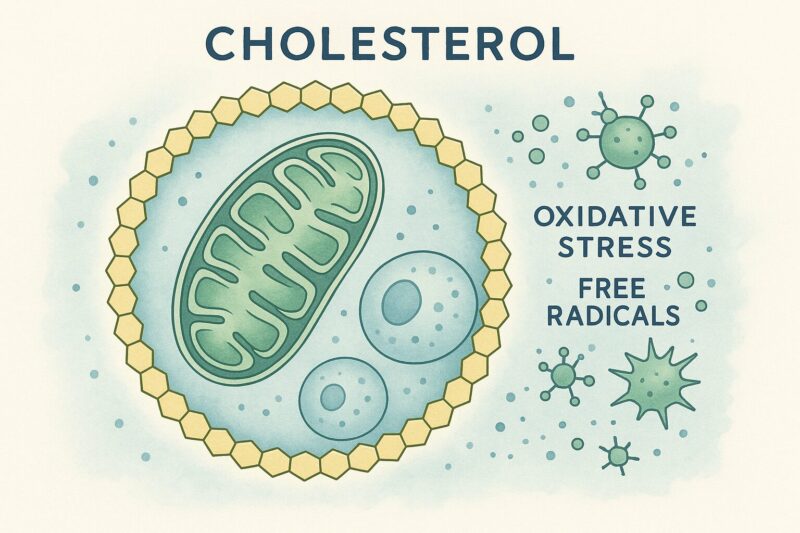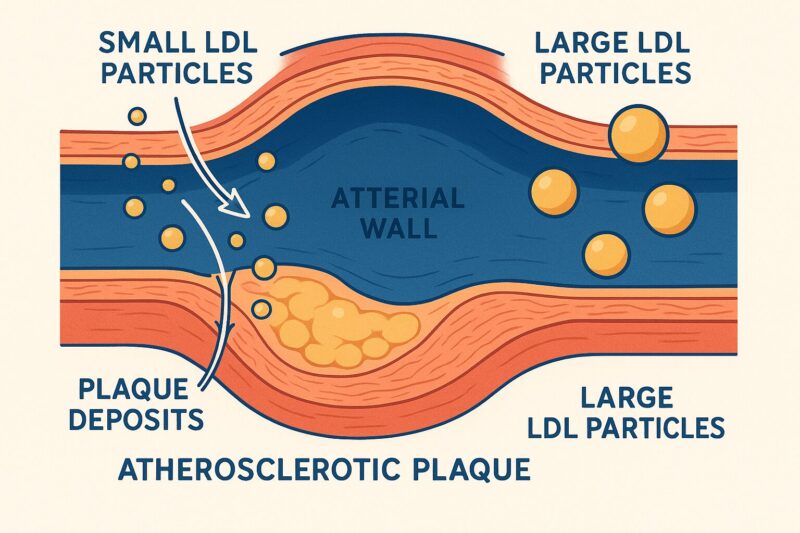The Cholesterol Truth – Why Everything You’ve Been Taught Is Wrong
The Great Cholesterol Myth: It’s Time to Set the Record Straight
For decades, we’ve been told that cholesterol is the villain – the dangerous substance lurking in your arteries, waiting to cause heart attacks. But what if I told you that everything you’ve been taught about cholesterol is not only wrong, but potentially harmful to your health?
The truth about cholesterol is far more nuanced and fascinating than the oversimplified “cholesterol is bad so it must be kept low” narrative that has dominated medicine for the past 50 years. It’s time to explore what cholesterol really does in your body and why higher levels might actually be protecting you.
Cholesterol: Your Body’s Powerful Protector
Far from being a dangerous substance, cholesterol serves as one of your body’s most important protective molecules. Here’s what cholesterol actually does for you:
1. Mitochondria Protector
“One of the basic functions of cholesterol seems to be the stabilization of mitochondria, preventing their destruction by stress.” Ray Peat
Your mitochondria – the powerhouses of your cells – depend on cholesterol for protection against the daily onslaught of free radicals and cellular stress. Without adequate cholesterol, these vital energy producers become vulnerable to damage and dysfunction.

2. Essential Hormone Precursor
Cholesterol serves as the raw material for all steroid hormones in your body, including progesterone, DHEA, and testosterone. “Since the protective hormones depend on the ability of mitochondria to convert cholesterol into pregnenolone, it is clear that damage to mitochondria will affect our supply of protective hormones.” Ray Peat
When you artificially lower cholesterol, you’re essentially cutting off the supply chain for these crucial protective hormones.
3. Brain Fuel and Cognitive Support
The healthy young brain contains an enormous amount of cholesterol – 99.5% of it in the pure, non-esterified form. Ray Peat This isn’t coincidence – your brain needs cholesterol to function optimally.
4. Neurosteroid Producer
Cholesterol is essential for producing neurosteroids – brain-protective hormones that are crucial for mood regulation and intelligence. “Low serum cholesterol has been associated with depression, suicide, violence, and increased cancer mortality.” Ray Peat
5. Anti-Inflammatory Shield
Cholesterol itself has anti-inflammatory properties and protects against various toxins, radiation damage, and environmental stressors. It acts like having a built-in detoxification system that works around the clock.
6. Cell Stabilizer
“When the cholesterol content of red blood cells is experimentally lowered, they become more rigid, and restoring the normal amount of cholesterol restores their flexibility.” Ray Peat
This demonstrates cholesterol’s vital role in maintaining cellular integrity throughout your body.
Why Cholesterol Naturally Rises with Age – And Why That’s Good
Here’s something most doctors never admit: cholesterol is supposed to increase as you age, and this is actually a protective mechanism.
In young people, the metabolic rate is high, and cholesterol is rapidly converted into protective steroid hormones like pregnenolone, DHEA, and progesterone. As we age and our metabolic rate declines, cholesterol levels naturally rise to compensate.
After 40: Protective Compensation
As we age and our metabolic rate declines, cholesterol levels naturally rise to compensate. “With aging, the metabolic rate declines, and the increase of cholesterol with aging is probably a spontaneous regulatory process, supporting the synthesis of the protective steroids, especially the neurosteroids in the brain and retina.” Ray Peat
After 50: Low Cholesterol = Higher Death Risk
“After the age of fifty, low cholesterol is clearly associated with an increased risk of dying from a variety of causes.” Ray Peat Research
Elderly (65+): Higher Levels = Better Longevity
Research shows that a cholesterol level of 270 mg/dL (7 mmol/L) was associated with the best longevity in elderly women – significantly higher than current medical guidelines suggest. Ray Peat
This means your body is actually getting wiser with age, increasing cholesterol production to maintain optimal hormone synthesis and brain protection.
The Dark Side of Cholesterol-Lowering Drugs
The push to lower cholesterol at all costs has led to some disturbing findings that the pharmaceutical industry would prefer you not know about:
Increased Cancer Mortality
Since the 1985 Hungarian study, multiple research studies have consistently shown that lowering cholesterol – whether naturally or through drugs – increases cancer death rates. “In the last 20 years, there have been many studies showing that lowering cholesterol increases mortality, especially from cancer and suicide.” Ray Peat
Higher Suicide Risk
The increased risk of suicide associated with low cholesterol stems from disrupted neurosteroid production. “The increased mortality from accidents and suicide when cholesterol is lowered is reminiscent of the problems seen in progesterone deficiency, and it’s very likely that a deficiency of the neurosteroids accounts for it.” Ray Peat
Cognitive Decline
“Since statins enter the brain, and inhibit the synthesis of cholesterol there, decreased mitochondrial function is undoubtedly a factor in the mental side effects that they can produce.” Ray Peat
Studies show that people with cholesterol in the “desirable” range (below 200 mg/dL or 5.2 mmol/L) actually scored lower on cognitive tests including verbal fluency, attention, and abstract reasoning compared to those with higher cholesterol levels.
Depression & Mood Disorders
By blocking protective brain hormone synthesis, statin drugs can trigger depression and mood disorders. The brain requires adequate cholesterol to produce the neurosteroids that regulate mood and emotional well-being.
Muscle Weakness
Dr. Peat believes that the side effects of decreasing cholesterol with drugs are directly related to cellular disruption in the mitochondria. This mitochondrial damage leads to muscle weakness and cellular dysfunction throughout the body.
Cellular Dysfunction
Statins disrupt normal hormone synthesis by interfering with the cholesterol-to-hormone conversion pathway, affecting everything from energy production to immune function.
The Real Culprits Behind Heart Disease
If cholesterol isn’t the villain, what is? The answer is more complex and involves factors that don’t have powerful lobbying groups defending them:
1. Polyunsaturated Fats – The Hidden Danger
The vegetable oil industry has successfully convinced us that their products are “heart-healthy”, but research tells a different story. When polyunsaturated fats (canola, sunflower, corn, soybean oil, margarine etc.) become oxidized – either through cooking or in your body – they accelerate the formation of toxic, oxidized cholesterol deposits in arteries.
Polyunsaturated fats become particularly dangerous when combined with stress, which accelerates their oxidation in your body. This creates a cascade of inflammatory damage that cholesterol is actually trying to repair.
2. Chronic Inflammation and Endotoxins
True heart disease risk comes from chronic inflammation, often triggered by toxins absorbed from the gut, poor liver function, and metabolic stress. Your body uses cholesterol and protective hormones to combat this inflammation.
3. Environmental and Lifestyle Factors
The real increases in heart disease mortality corresponded with increases in:
- Processed food consumption
- Environmental pollution
- Radiation exposure (medical, military, industrial)
- Cigarette smoking
- Chronic stress
- Deficiencies in protective nutrients (selenium, magnesium, vitamins)
4. Hypothyroidism
“High cholesterol usually indicates low thyroid function. When thyroid is low, cholesterol isn’t converted efficiently into progesterone. The real cause of heart attacks seems to be hypothyroidism and its effects.” Ray Peat
LDL Particle Size: What Really Matters
Here’s a game-changer that mainstream medicine is slowly acknowledging: the size of your LDL particles is far more important than the total amount.

Smaller LDL particles are more susceptible to oxidative damage and are more likely to contribute to arterial plaque formation. Larger LDL particles are actually protective.
What promotes larger, healthier LDL particles?
- Consumption of natural animal fats (butter, eggs, meat, whole milk and dairy products made of it)
- Adequate cholesterol intake
- Balanced hormone levels (especially progesterone in relation to estrogen level)
What creates smaller, more dangerous particles?
- Trans fats and polyunsaturated fats
- High estrogen states
- Chronic inflammation
- Metabolic dysfunction
The Protective Power of Saturated Fat
Studies comparing butter to margarine found that people eating butter had larger, less atherogenic (ie. (promoting atherosclerosis) LDL particles. Also research on egg consumption showed that eating 2 eggs daily resulted in “the generation of a less atherogenic LDL”.
This completely flips the conventional dietary advice on its head – the foods you’ve been told to avoid (eggs, butter, animal fats) are actually promoting healthier cholesterol profiles!
Supporting Your Body’s Cholesterol Wisdom
Instead of fighting your body’s cholesterol production, focus on supporting its protective functions:
Nutritional Support:
- Ensure adequate intake of antioxidants (from foods: minerals, fruit, berries and vegetables)
- Support thyroid function with proper nutrition
- Eat foods rich in protective nutrients like magnesium and B vitamins (from meat, dark chocolate, seafood)
- Choose stable, saturated fats over polyunsaturated oils and margarine
Lifestyle Factors:
- Manage stress and overall strain effectively (long-term stress accelerates harmful oxidation)
- Support liver health for proper cholesterol metabolism
- Maintain healthy hormone balance
- Avoid unnecessary radiation exposure (not talking about sun but X-rays, CT scans, certain industries, shut down Wi-fi´s for the night)
- Do weight training and have your basic daily activity (supports a higher metabolic rate, improves hormonal profile).
The Bottom Line
The cholesterol hypothesis has been one of the most damaging and persistent myths in modern medicine. Cholesterol is not the cause of heart disease – it’s often the body’s response to the real causes.
By understanding cholesterol’s true protective role, supporting your body’s natural wisdom, and addressing the real risk factors for cardiovascular disease, you can make informed decisions about your health that align with both science and physiology.
Remember that cholesterol is not your enemy – it’s your body’s attempt to protect and heal. Instead of suppressing this protective mechanism, focus on addressing the root causes of inflammation and oxidative stress.
The next time someone tells you that cholesterol is dangerous, remember: your body has been making this vital substance for millions of years of evolution. Maybe it’s time to trust that ancient wisdom over modern pharmaceutical marketing.
For more evidence-based health insights and training tips, visit www.trainermira.eu and follow @trainer_mira on Instagram.